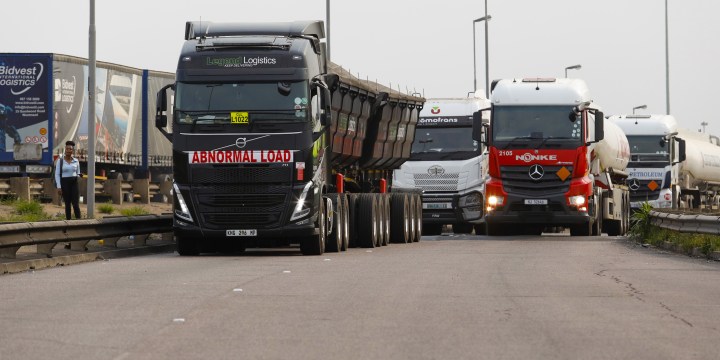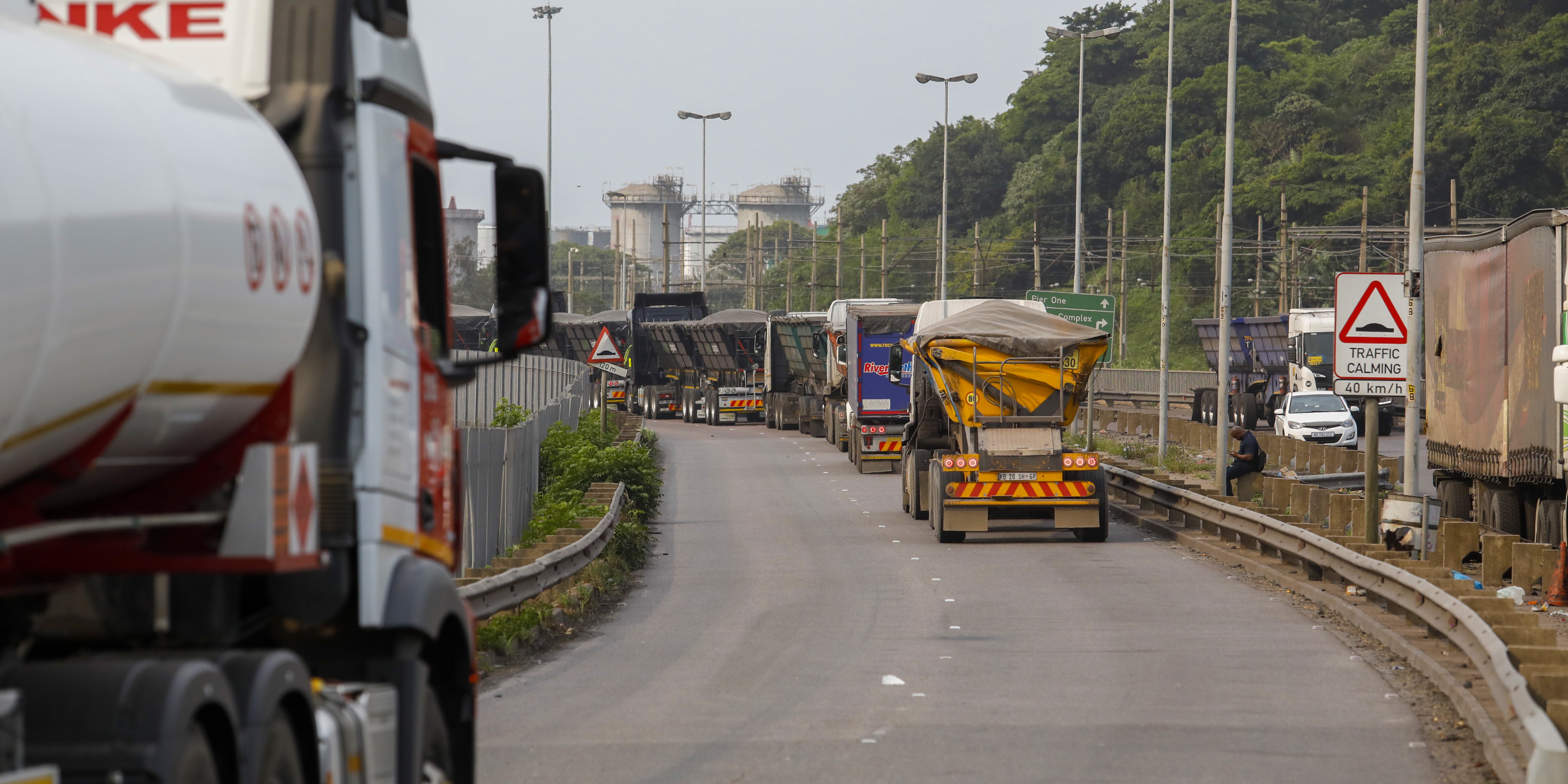DURBAN PORT DEBACLE
R1bn a day — SA counts the cost while Transnet strike drags on

The strike by thousands of Transnet workers will sooner or later come to an end, but it will leave a lasting legacy at Durban’s port — the biggest in sub-Saharan Africa.
The strike began this week at Transnet — the national ports and freight-rail operator — after wage talks deadlocked between unions and management. Initially, workers demanded a wage increase of between 12% and 13.5%, and rejected a proposed 3% hike offered by Transnet.
When the strike was declared, the operator immediately declared a force majeure, telling its clients it was unable to fulfil its commitment due to the industrial action.
Read more in Daily Maverick: “Transnet Port Terminals declares force majeure in the wake of ‘illegal strike’ ”
On Wednesday evening, after talks brokered by senior government ministers, hopes for a deal that would end the strike were dashed when unions rejected a revised offer of 4.5%. They demanded 7% and threatened to intensify the strike.
The strike is the latest catastrophe to hit Durban. First, there was the July unrest last year, then, in April this year, devastating floods destroyed some of Transnet’s critical infrastructure, including railway lines.

Hundreds of trucks queue in Island View, Durban, near the Bluff this week as they wait to enter the harbour — the result of the strike at Transnet. (Photo: Mandla Langa)
According to a statement from the Minerals Council of South Africa (MCSA) — a lobby group whose members account for more than 80% of Transnet’s rail business — South Africa exports almost half a million tons of bulk minerals worth R1.1-billion rand each day.
The MCSA said the strike action had slashed exports to 120,000 tons, with all the major harbours operating at between 12% and 30% of their normal daily capacities.
‘Deeply concerned’
“The Minerals Council is deeply concerned that the labour action at Transnet will compound the losses our bulk mineral exporting members are already experiencing because of Transnet struggling to meet targeted annual tonnages on its rail network and throughput at ports,” the MCSA said in a statement.
It’s estimated that bulk mineral exporters are losing R815-million worth of exports per day because they are unable to rail and load 357,000 tonnes of iron ore, coal, chrome, ferrochrome and manganese on to ships every day.
The Minerals Council estimates an export loss of R50-billion on an annualised basis this year for iron ore, coal, chrome, ferrochrome and manganese exporters as measured by delivered tonnages against contracted rail tonnages.
“This compares with a loss of R35-billion in 2021 based on the same metric,” the statement said.
The concerns are shared widely, as it is not only the mining sector affected by the strike.
Business ‘can ill afford’ strike
Prasheen Maharaj, president of the Durban Chamber of Commerce and Industry, said they estimated that the Transnet strike would cost the economy about R1-billion a day. Maharaj said a Transnet strike in 2010 had cost the economy R7-billion.
So far, he said, the strike has cost the local economy more than R3-billion and that it would take 10 days to clear the backlog created by each day of the strike. He said the unions and Transnet needed to work together to resolve the crisis as soon as possible.
“We had the pandemic, looting, flooding, the cyber-security attack in the port and the truck strike. The economy is on its knees, hanging by a thread, and can ill afford this strike.”
The Chamber of Commerce was part of a business partnership that pledged to pay Transnet between R130 and R148 per container for each export port handling fee until April, so the parastatal could afford an above-inflation increase for the workers.
Port’s viability
But the KwaZulu-Natal Business Chamber Council (KBCC), an umbrella body for all the chambers in KZN, said it does not support the Special Levy to Transnet initiative because local businesses are already on their knees. The council says local businesses cannot afford a special levy to pay Transnet to meet its salary hike obligations.
Dominic Collett, the council’s head, told Daily Maverick on Thursday afternoon that their view is that both unions and Transnet should look at the implication of the strike on the long-term viability of the Durban port.
“The council’s view is that amicable and realistic negotiations and solutions must be found (between Transnet and its unions). If that port closes it affects the whole region and puts pressure on everyone. The local economy has suffered from the recent looting and mayhem in KZN and parts of Gauteng.
“There was also flooding and the impact of Covid-19. There is so much going on… the local businesses are on their knees. They cannot afford to pay a special levy to Transnet to pay workers,” said Collett.
Business Unity SA leader Bonang Mohale said the strike was the latest self-inflicted wound on Durban’s port in particular and the South African economy in general.
He said regular outbreaks of violence on the N3 and the burning of trucks in protest at the hiring of foreign drivers have put the viability of Durban’s port at risk.
Latest wage offer
On Thursday, Transnet announced it had tabled a three-year wage offer to its recognised unions — the South African Transport and Allied Workers Union and the United National Transport Union — during the two days of wage talks facilitated by the Commission for Conciliation, Mediation and Arbitration.
“The negotiations have been a delicate balancing act for the company — mindful not only of the affordability and sustainability of the wage increases for the business, but also having full appreciation of the cost pressures that employees face currently,” Transnet spokesperson Ayanda Shezi said in the statement.
“Whilst the parties have not settled on this offer, engagements are ongoing. We would like to thank all stakeholders for their continued understanding and support during this process. The company remains committed to concluding the wage negotiations speedily and amicably, in the interests of employees, the company and the economy,” Shezi said.
Workers cite runaway prices
Hans Phethu, a shop steward and Transnet welder at the Durban harbour, was among the striking workers who picketed Transnet facilities on Wednesday.
He said the unions would not accept a wage offer that was below inflation, adding that workers had endured runaway prices for petrol, food and school fees.
“Our minimum requirement is a 7% or above wage increase. Workers have been absorbing difficulties while the management has been getting huge bonuses.”
He said Transnet workers had worked hard to save the South African economy during the hard months of the pandemic and had received no wage increase for the past three years.
This was echoed by Phumzile Khuzwayo, a 43-year-old stock controller at the harbour. She said workers at the port and other Transnet facilities throughout the country were facing mounting difficulties.
“When we started working here, we were earning enough money to afford our lifestyles. Now people are losing vehicles, they cannot buy basic foods, are reneging on bond repayments and children are being chased away from their schools because we cannot afford to pay school fees.”
Read more in Daily Maverick: “Transnet far from being financially and operationally sustainable despite “accounting profit”
On Wednesday and Thursday, truck drivers from across the country said they were hit hard by the strike. Some drivers said the impact would be felt for several years.
Joseph Msimang, a Witbank-based driver with more than 25 years’ experience, said he had been waiting at the port entrance in Island View for hours. He was in a long queue of trucks, waiting to offload coal bound for Western Europe to meet rising demand for supplies.
“They pay us for every kilometre we drive. Now that we are stranded here, we will not get paid. Every time there is a strike at the harbour, it is us truck drivers who suffer the most.”
Visit Daily Maverick’s home page for more news, analysis and investigations
One 37-year-old driver, who asked not to be named, was also waiting in the long queue to offload manganese from mines in the Northern Cape.
“The queues are moving very slowly. We don’t have food to eat and we have not washed. We will feel the impact at month-end when we get our pay. Also, we are scared that the crime syndicates will use the cover of the strike to start stealing ropes and truck lights.
“Durban harbour was one of the best in the country. But over the years, the services have gone down. Even the Port Elizabeth port services are better than here… the time we spend offloading there is far less than we spend here,” he said.
Lindeni Mpisi, a 57-year-old woman selling food and refreshments at the Island View section of the harbour, was doing a brisk trade on Wednesday afternoon. However, she lost out during the first few days of the strike because the trucks weren’t allowed into the area.
“I was forced to take all my food back home. At least now the truckers are allowed in and they buy food from me while they are waiting.” DM
















 Become an Insider
Become an Insider
Transnet should simply communicate to the Unions what their salary budget for the striking staff is and ask the Unions how many people they would like to be employed at what salary levels, in order to ensure a balanced budget. Also when increases are quoted as a percentage, this is on what existing salary amount? Are they already above or below the market?
I remember how at the end of 2019 a strike over wages pushed an already shaky SAA over the brink. SAA never recovered and many jobs were lost.
It is about time the LRA clauses on strike action are updated to allow for wage arbitration rather than industrial action if either party requests it. Final wage settlements are never where unions demand they be. Wage arbitration for essential services should be compulsory.